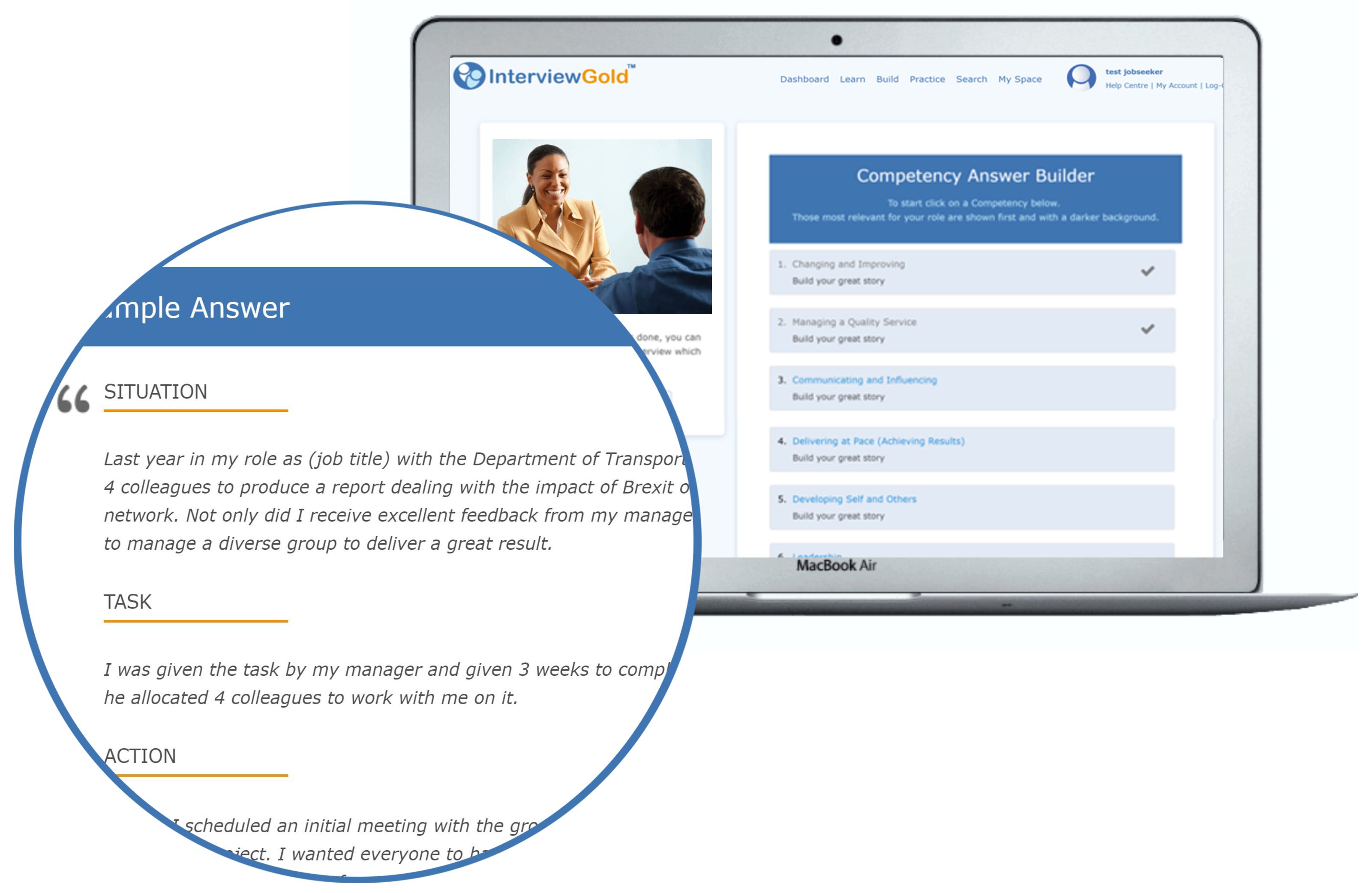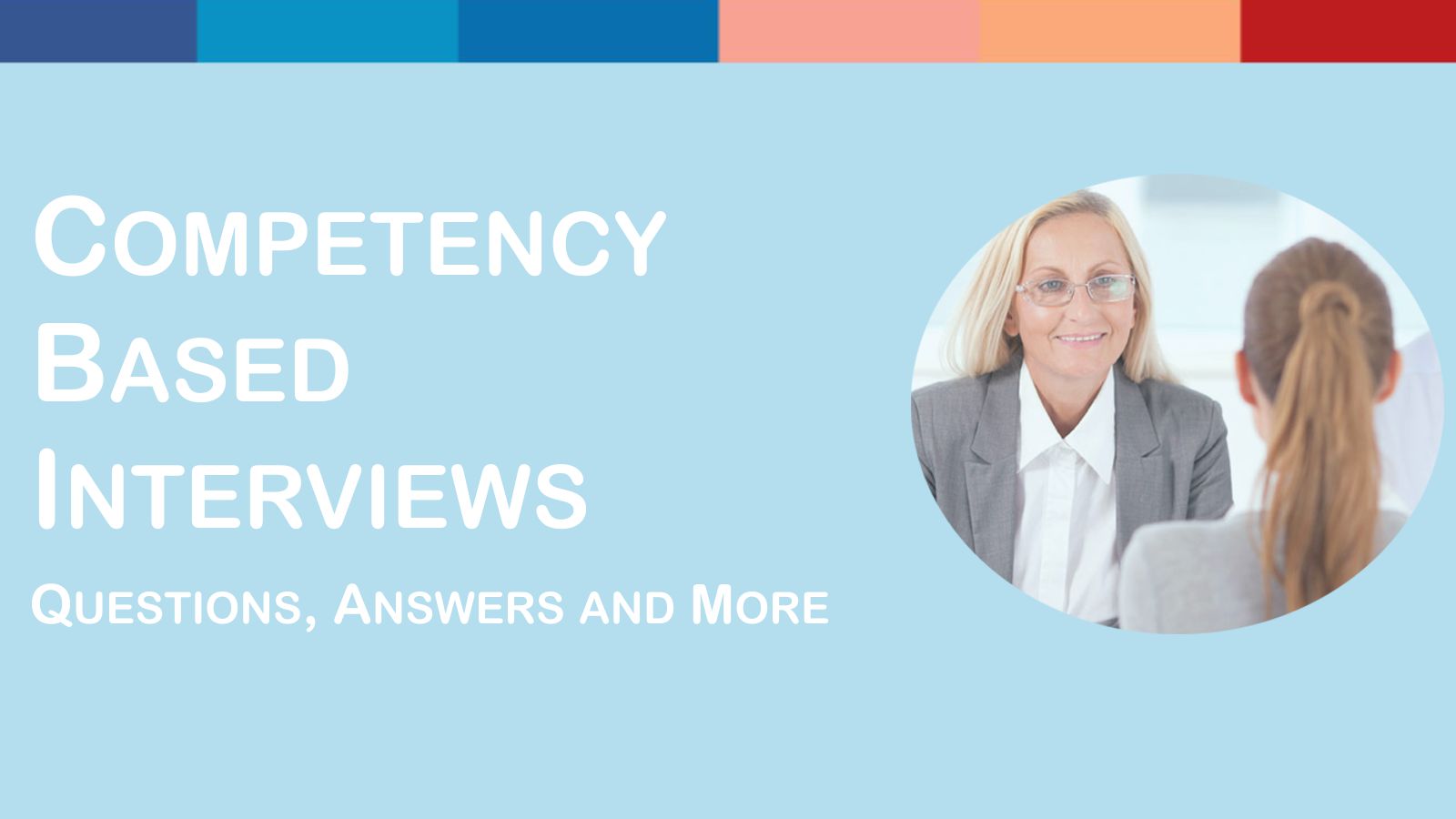
Competency Based Interviews are still here in 2024!
Despite changes to recruitment processes, as we have seen with the Civil Service’s move to using Success Profiles Behaviours some time ago, competency based interviews are still very much in vogue at all levels. They may not be as tightly structured as before however they are an effective means of exploring prior experience and are still very popular.
They are also still very challenging and in our 121 coaching practice we see clients at all levels who struggle with giving good answers that score top marks.
In this article, we provide you with your ultimate guide to competency based interview questions and answers. We list 55 of the most common and tough competency questions they can ask and we talk about how to answer. We look in detail at 12 of the top competencies you are likely to be asked about in your interview.
We explain what is involved, we list some todays most common competency based interview questions and we outline some great examples to inspire your answers.
Download our handy PDF guide to competency based interviews here.
Just to mention if you are searching for information about situational interview questions or indeed behavioural interview questions then this article is right for you. They are different terminologies for what is essentially the same framework, and the questions and answers will all be relevant for you.
In this article:
- What is a Competency Based Interview?
- About Competency Based Interview Questions
- Top UK Competency Based Interview Questions
- About Civil Service Behaviours and Competency Based Interview Questions
- 12 Core Competencies With Questions and Examples for Your Answers
- 1. Changing and Improving / Change Management
- 2. Communicating and Influencing / Communication
- 3. Delivering at Pace
- 4. Developing Self and Others
- 5. Leadership
- 6. Making Effective Decisions / Decision Making
- 7. Managing a Quality Service
- 8. Managing Conflict
- 9. Problem Solving
- 10. Planning and Organising
- 11. Seeing the Big Picture
- 12. Working Together (Teamwork)
- Competency Based Interview Questions and Answers for Managers
- How to Answer Competency Based Interview Questions Like a Pro
- Sample Competency Interview Answer – Use this as a Guide
- Get More Winning Answers to Competency Based Interview Questions
What is a Competency Based Interview?
A competency based interview is one which is structured in format with all candidates asked the same questions in the same order. These questions will be competency based or behavioural and will ask you to give an example of a time when you performed a competency, task or skill successfully in the past. They will ask probing or follow on questions to gather evidence from you which supports your answer.
About Competency Based Interview Questions
Competency based interview questions can be phrased in a number of ways however they almost always start with something like:
- Tell me about a time when…
- Describe a situation when…
- Talk me through a situation when…
Something to be aware of; even if your interview is not described as such, it is very likely in today’s UK recruitment market that you will be asked competency based interview questions. Keep in mind too you may see them referred to as behavioural interview questions or situational interview questions.
Top UK Competency Based Interview Questions
Let’s get started with these 15 tough competency based interview questions we have come across recently here in the UK. Take a moment and see how would you answer them:
- Tell me about a time when you successfully conveyed your ideas to an individual or group so that they were able to understand and retain the message. (Communicating and Influencing)
- Tell me about a time when you had to deliver bad news. What was the situation and what actions did you take? (Communication)
- Describe for me a situation where you were required to gather a large amount of data, to analyse it objectively and to make a decision or a recommendation based on the results. (Effective Decision Making)
- Talk me through a time when you had to implement challenging and measurable goals for your team.(Delivering at Pace/ Delivering Results)
- Provide an example of a time when you did something exceptional. (Delivering at Pace)
- Describe a situation when you were required to use your initiative to complete a complex task. (Initiative)
- Give me an example of a time when you led a group of people to deliver a particularly difficult task. (Leadership)
- Tell us about a time when you showed leadership. What did you learn from the experience? (Leadership)
- Can you give me an example of a time when you have had to convince a person to do something that they were initially reluctant to do? (Communicating and Influencing)
- Tell me about a time when you had to consider conflicting workloads, when planning a task or project. (Planning and Organising)
- Talk through a situation where you had to develop a solution to a complex problem which could not be resolved by using existing methods. (Problem Solving)
- Tell me about a time you had to persuade your team to implement an unpopular policy or procedure. (Communicating and Influencing)
- Describe a recent situation when you worked across departments successfully. (Seeing the Big Picture)
- Lead us through an example which shows your ability to manage resources effectively.(Managing a Quality Service)
- Tell me more about your ability to initiate change and give an example when this resulted in an improvement. (Changing and Improving)
Answer any Competency Interview Question Perfectly
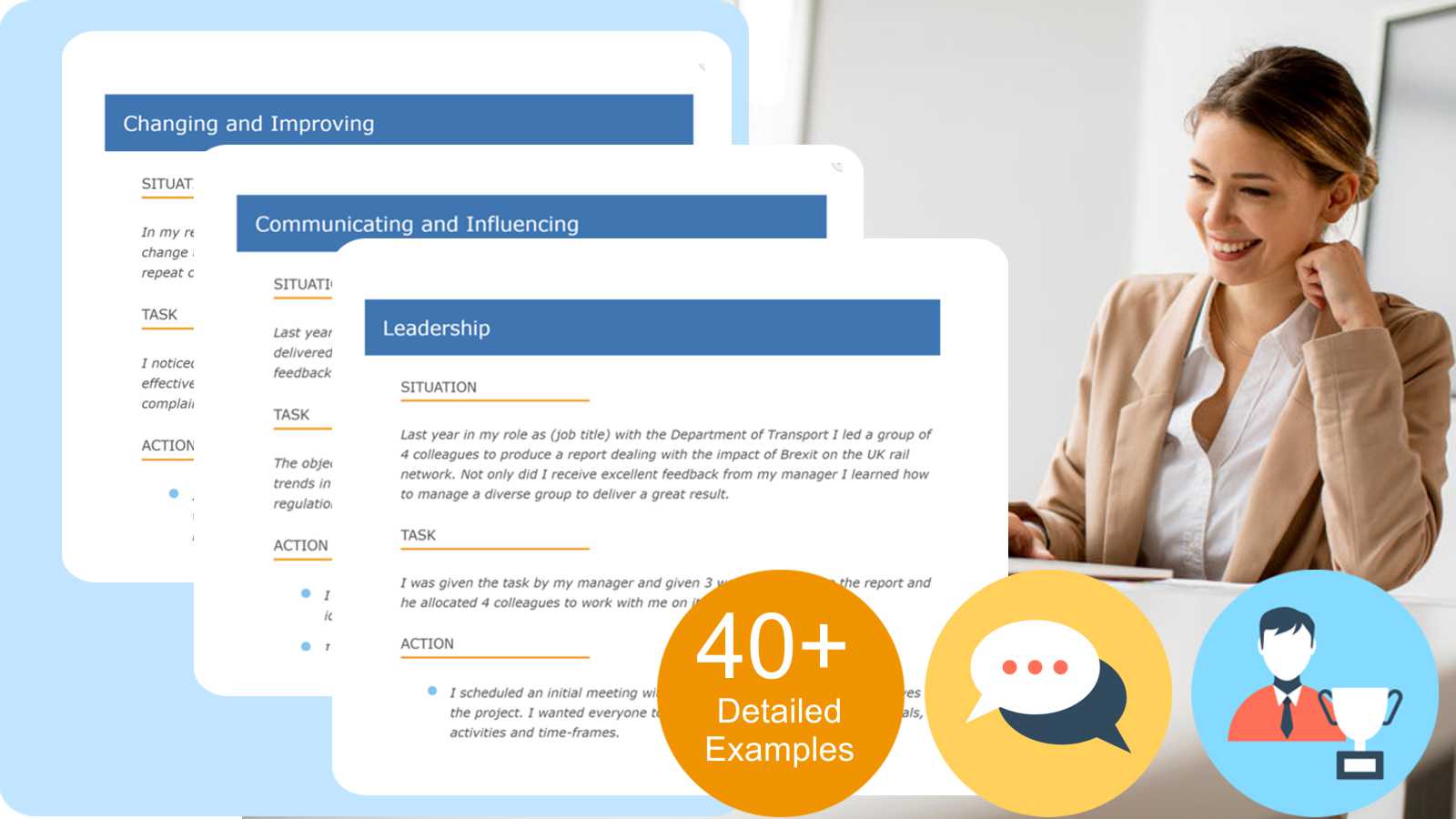
Join InterviewGold today and get instant access to expert STAR answers, job specific questions plus powerful answers, proven to help win jobs.
About Civil Service Interviews: Success Profiles Behaviours and Competency Based Interview Questions
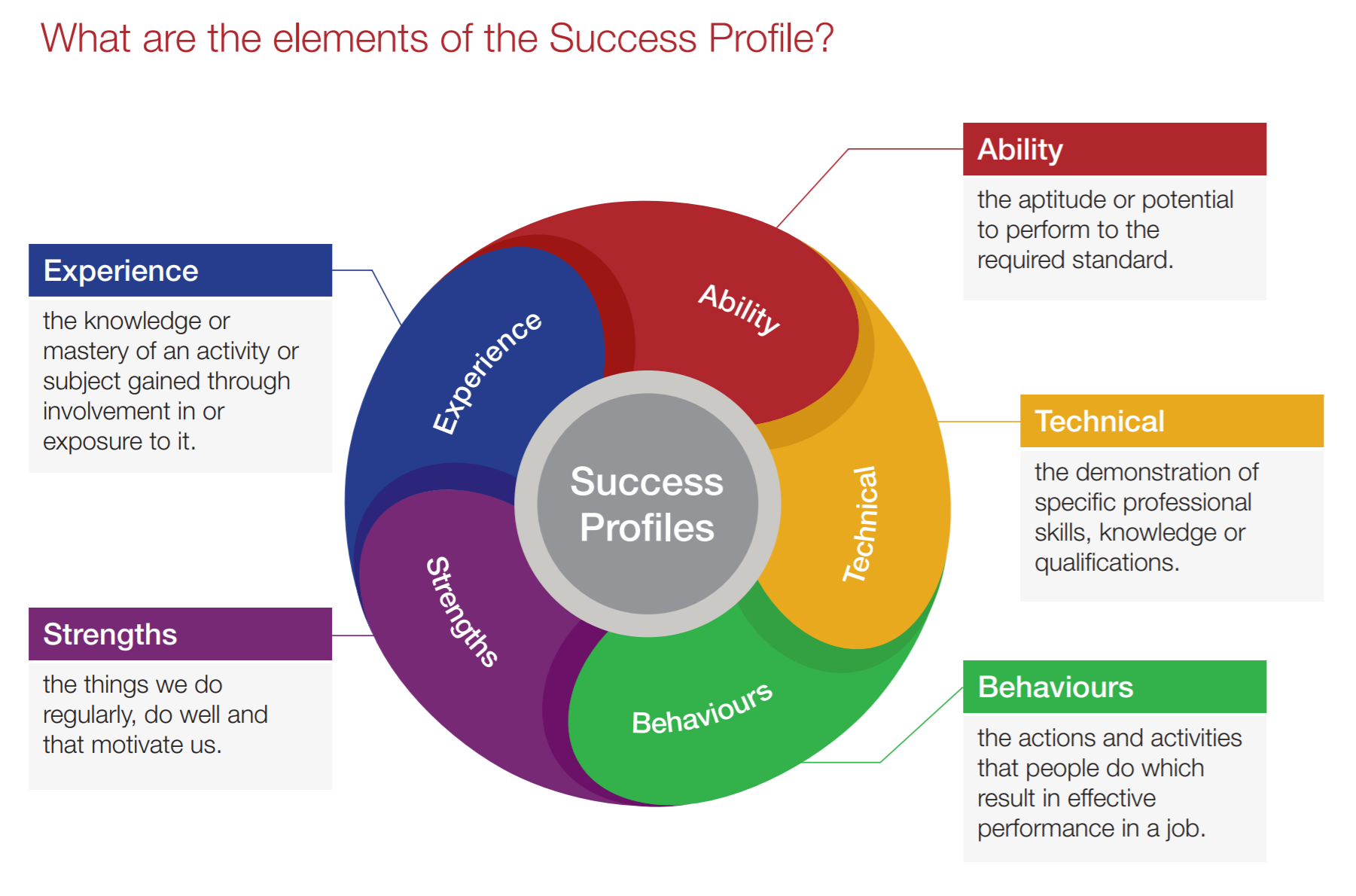
You should be aware that UK Government and Civil Service departments have moved away from competency frameworks and have adopted Success Profiles as their new recruitment framework going forward.
This consists of 5 elements and one of those is called the Success Profile Behaviours and within this there are 9 behaviours (previously known as competencies) listed as follows: Seeing the Big Picture, Changing and Improving, Making Effective Decisions, Leadership, Communicating and Influencing, Working Together, Developing Self and Others, Managing a Quality Service and Delivering at Pace.
While these form the core of the Civil Service Success Profiles Behaviours, they are competencies that are common to most employers and are still used within most Competency Based Interviews.
Even if you are not going for a job within Government or the Civil Service, this guide should be essential reading for you. We find that large employers such as the UN, Banks, the NHS, Insurance Companies, Law Firms and indeed smaller and medium sized organisations often adopt methods used by Government.
In summary, whatever organisation, role or level you are being interviewed at you will be asked competency questions relating to some of these. Keep in mind the titles may vary slightly from one employer to another however the core skills and effective behaviours are the same.
Get Competency Questions and Expert STAR Answers Specific to Your Target Job
12 Top Competencies With Interview Questions and Examples for Your Answers
In this guide we examine 12 of the most common competencies you will encounter in any interview. From Seeing the Big Picture through to Deliver at Pace, we outline what is involved, we show typical questions and we give you some example situations which you can use to refresh your memory.
1. Changing and Improving / Change Management
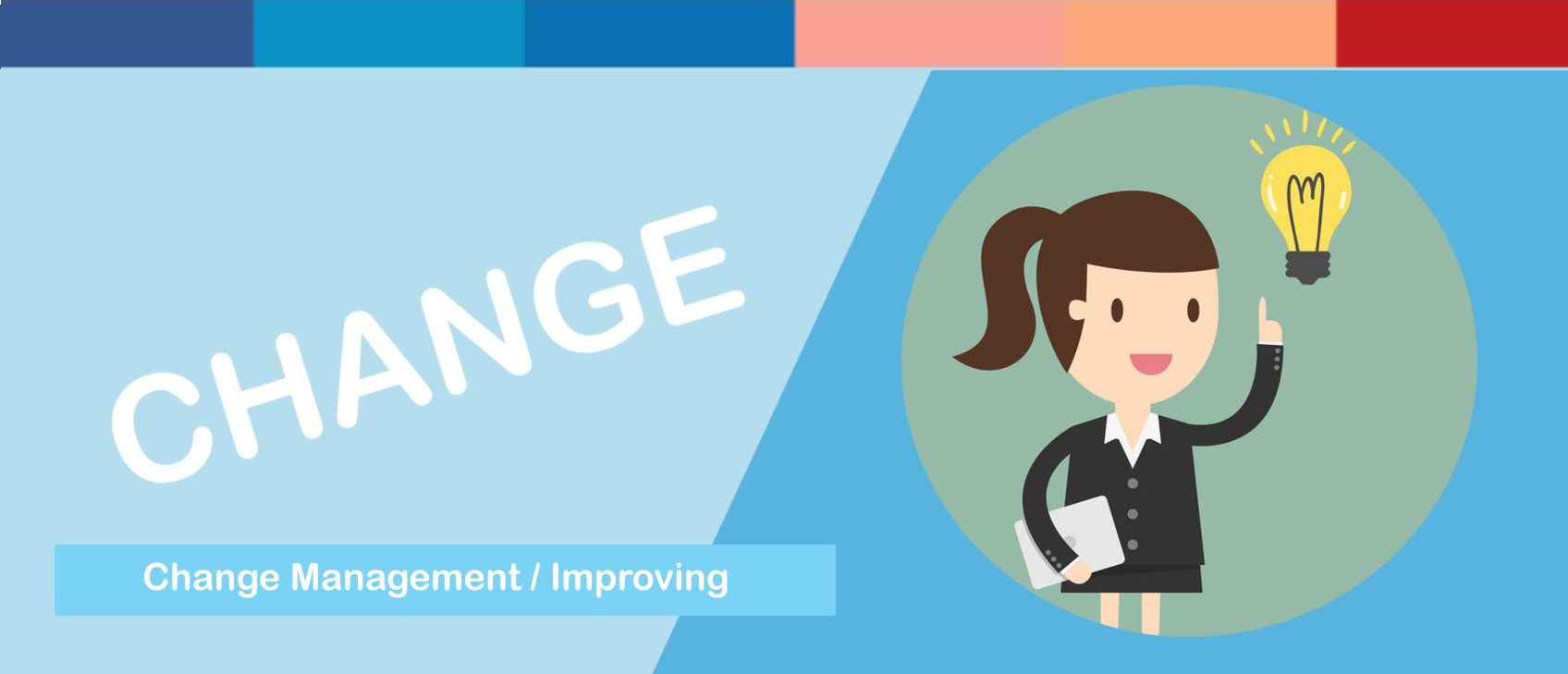
In so many competency based and behaviour interviews we see candidates struggle with answering questions about Changing and Improving (or Change Management as it is often called) and yet it is an activity that is so common.
This is a core competency which relates not just to senior positions but is relevant for all staff. It is required in so many jobs in a range of employers including the Civil Service, NHS and major organisations across the UK.
Indeed, internationally the ability to change and adapt is essential and you will find some form of this competency used for example in the United Nations (UN), government departments and other large groups.
What does the Changing and Improving behaviour mean?
Changing and Improving in a work environment means having the ability to identify areas for improvement and take action to make appropriate and successful changes.
It involves using your initiative to look for more efficient and better ways to complete your work. Then taking steps to make the change happen.
The ability to identify areas for improvement and act is important both in the working environment and in your everyday life. People who have this skill will actively look for opportunities where an effective change could be made.
Competency Based Interview Questions for Changing and Improving
Here is a small selection of competency based interview questions related to Changing and Improving taken from the InterviewGold online training. How would you answer?
- Talk us through a recent situation when you had to deal with change.
- Describe a time when you improved the way you work – perhaps found a way to do a task more efficiently.
- Tell us about a new product, process or service you devised and implemented in your work.
Changing and Improving Examples You Can Talk About
All aspects of work can be improved upon in some way and being able to identify these changes and improvements is a skill that prospective employers and interviews will look for.
Similarly, being able to adapt to changes is vital and in your answer, you will need to choose a strong and relevant example which demonstrates these skills. A strong high scoring response will have relevant examples which are sufficiently complex for your level.
Here are some Changing and Improving examples for you to consider when choosing what to talk about.
- Did you take on a new task with full responsibility and enthusiasm?
- Have you had to quickly adapt to new ideas or ways of working?
- Maybe your working environment or location altered and you performed efficiently throughout the change?
- As a manager, perhaps you initiated and implemented major transformation programmes right across departments or organisations?
Whatever example you choose for your application or interview, it must be relevant, ideally recent and it should be sufficiently detailed to display effectiveness with this behaviour correctly.
Civil Service Interview Coming Up?
Pass your Civil Service interview with InterviewGold’s powerful online system. Get expert STAR answers, Personal Statements, blended mock interviews and much more.
2. Communicating and Influencing / Communication
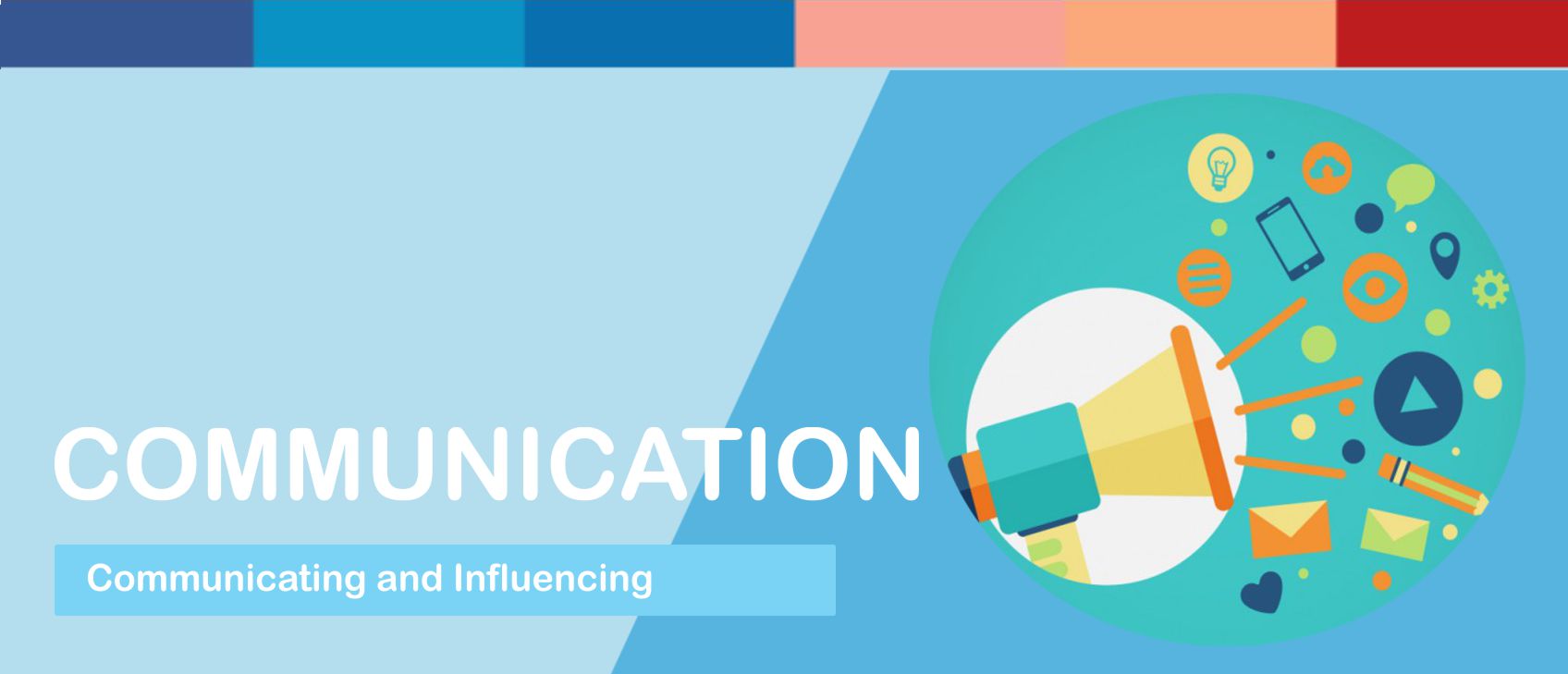
Communication skills are essential in almost all roles and your interview is a perfect opportunity to display yours. Whether you realise it or not you are using your Communicating and Influencing skills constantly both inside and outside of work.
The application and interview are ideal opportunities to display yours The moment you enter the interview, whether live or via video your ability to communicate will be on show.
Expect competency based interview questions exploring this behaviour and for more senior posts a presentation may be used to test your ability to communicate to the panel. A topic will usually be given in advance and you will have time to prepare.
What does the Communicating and Influencing behaviour mean?
From a practical point of view, Communicating and Influencing means getting your message across in a way that is understood by your audience.
Being able to communicate clearly, honestly and concisely both orally and in writing in a persuasive and accurate way.
A major part is being able to take the views of other people into consideration and using your skills to persuade them of the value of your ideas.
For senior posts, it means introducing new and more effective ways of communicating, perhaps using digital resources whilst getting value for money.
Communicating and Influencing Competency Interview Questions
Here is a small selection of competency based interview questions related to Communicating and Influencing taken from the InterviewGold online training. How would you answer?
- Talk me through a time where you used your communication skills effectively resulting in a successful outcome.
- Describe a time when you successfully conveyed your ideas to an audience who were unfamiliar with the subject matter.
- Tell me about a time when you had to communicate complex technical information to a client. What was the situation, what approach did you take and what was the result?
In order to answer questions successfully you will have to think of examples of when you were effective when communicating either in the workplace or outside. Effective communication and influencing can be displayed in many forms and here are some potential scenarios to help refresh your memory when choosing your examples.
Communicating and Influencing Examples
To answer successfully, you will have to think of examples of when you were effective with this competency in the workplace or outside.
There will be untold scenarios where you have used your communicating and influencing skills and your answer must include an example which is complex and relevant. Show an understanding of good communication and an ability to communicate and influence at all levels.
Effective communication and influencing can be displayed in many forms and here are some potential scenarios to help refresh your memory when choosing your examples.
- In the past, have you communicated complex information clearly in a straightforward, honest and engaging manner perhaps in a written report or verbally?
- Have you given a presentation to a group of people and dealt with questions?
- Have you presented technical or complex information to a non-technical group and made it easy to understand?
- Did you persuade other to accept your point of view, perhaps got buy-in for your recommendations?
Pass any Competency Based Interview With InterviewGold
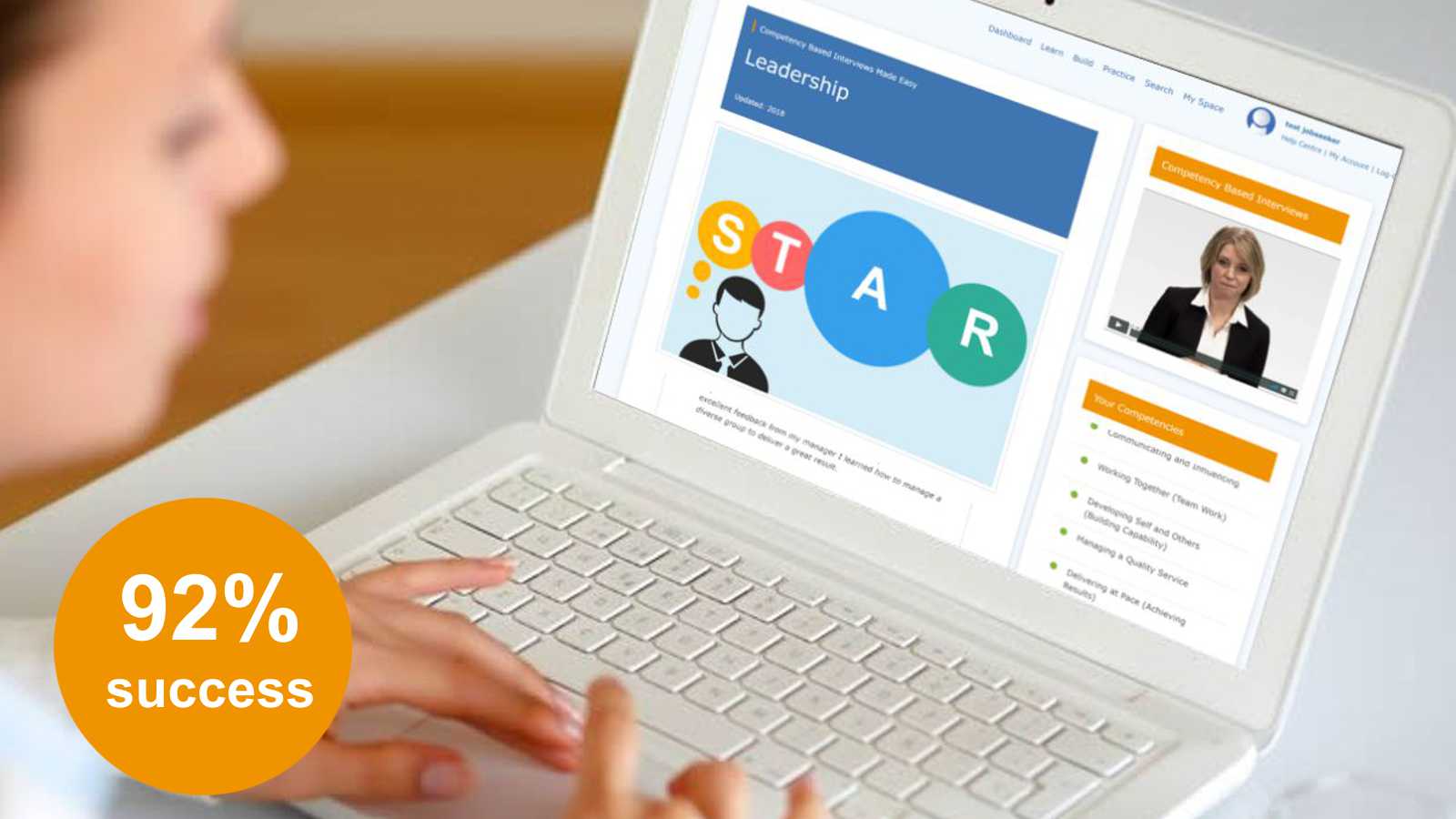
3. Delivering at Pace
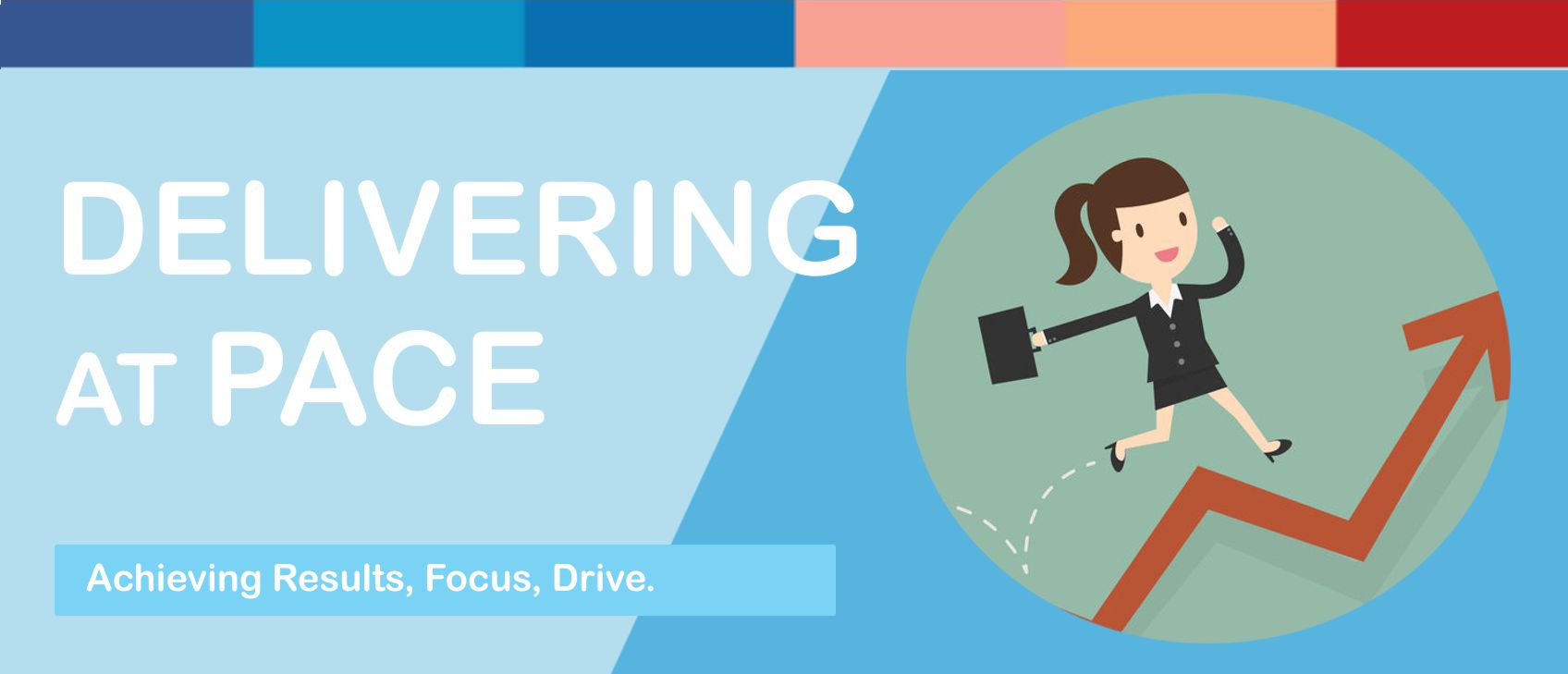
Delivering at Pace is all about getting the job done on time and to the expected standard. You may also see it referred to as Achieving or Delivering Results or Operational Delivery and it deals specifically with the performance of tasks.
This is another of the core 9 Civil Service behaviours and it encompasses a number of additional competencies, such as Planning and Organising and Time Management. It covers the ability to maintain focus and dedication, to follow procedure, and to use your own initiative.
We are seeing this used in all Civil Service and Government Department roles including in the Home Office, Department of Transport, HMRC and the DWP.
What does Delivering at Pace mean?
Your ability to get the job done, to deliver on time, within budget and to a required standard is a universal skill. Most employers, not just the civil service will expect this behaviour.
From a work context, Delivering at Pace relates to the way you perform in your role and it deals specifically with the performance of tasks. Another way of thinking about it is how to deliver the results they want while under pressure and overcoming obstacles.
Put into simple terms, Delivering at Pace means:
- Producing top quality results within pre-set and often tight deadlines, making sure that you monitor your own and your teams progress and overcome any obstacles.
- Stay focussed on the outcome, even when the going gets tough, staying positive throughout and bringing your colleagues and team with you.
- For senior roles, it involves managing the workload of the team, reviewing progress, identifying and overcoming barriers.
- Proper planning, ensuring the right resources are in place and delivering projects in line with objectives and goals.
Delivering at Pace Competency Interview Questions
Here is a small selection of competency based interview questions related to Delivering at Pace taken from the InterviewGold online training. How would you answer?
- Give us an example of when you delivered an exceptional result detailing obstacles you encountered.
- Tell us about a time when you were unable to complete a task within the set deadlines.
- Describe a situation when you had to make a change in order to deliver a project.
Delivering at Pace examples you can talk about
To be effective at Delivering at Pace and Achieving Results you must be focused on offering a timely performance with enthusiasm. It is also all about taking full responsibility and accountability for the outcomes and results of your work.
Delivering at Pace and Achieving Results can be displayed in many forms and here are some potential scenarios to help refresh your memory when choosing your examples.
Can you recall a time when you…
- Prioritised your tasks in order to get through a heavy workload.
- Dealt with changes to your workload, perhaps your boss asked you to complete a task towards the end of the day.
- Encountered a major obstacle when delivering a project, something that you ultimately overcame.
Civil Service Interview Coming Up?
Pass your Civil Service interview with InterviewGold’s powerful online system. Get expert STAR answers, Personal Statements, blended mock interviews and much more.
4. Developing Self and Others
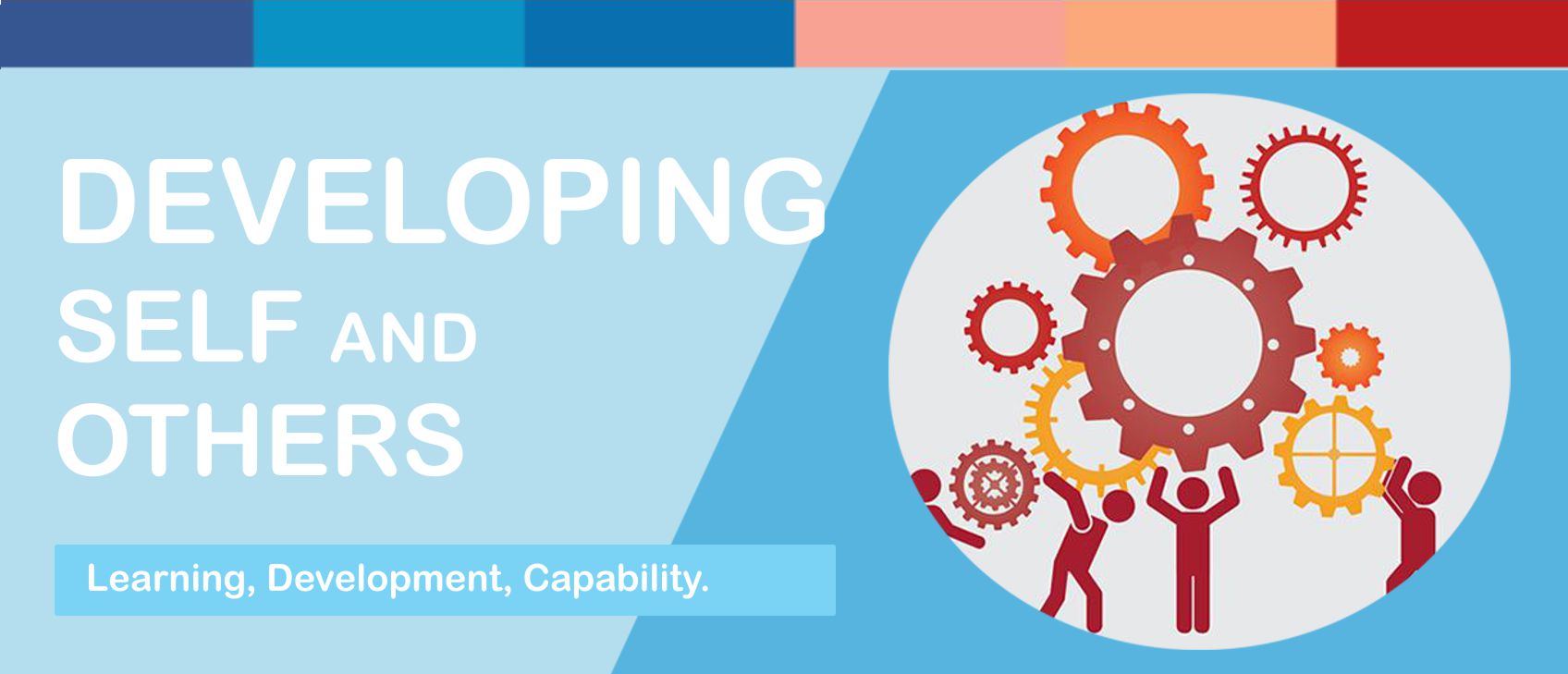
Most individuals who are successful in their careers share the characteristic of self-development. In fact, continuous professional development is a key activity in all our careers. Both in the workplace and outside, continually looking for ways to develop and improve yourself is an excellent skill.
What does the Developing Self and Others competency mean?
Developing Self and Others involves looking for gaps in your skills and knowledge and making plans to overcome these gaps. It is all about taking responsibility for your own development acting on feedback from colleagues or appraisals and indeed sharing your learning with others in your team. It is sometimes referred to as Empowering Others and for senior posts, in addition to the above, it is about helping your team to develop their skills to seek learning opportunities and to support the development plans of all colleagues.
Developing Self and Others Competency Interview Questions
Here is a small selection of competency based interview questions related to Developing Self and Others taken from the InterviewGold online training. How would you answer?
- Describe a time when you helped a colleague improve their work effectiveness.
- Tell us about a time when you enabled a team member to develop a new skill.
- Can you describe a time when you have had to deal with poor performance and the approach you took to resolve it.
Competency answers – Developing Self and Others examples you can talk about
During most interviews, you will likely be asked about developing self and others using competency questions. The interviewer will be looking for answers that include evidence and examples of times when you have actively sought to develop your own skills and encouraged and helped others to expand their knowledge.
For example, can you recall times where you have done the following:
- Identified ways to develop yourself, completing all in house training, perhaps requesting additional training courses or other on the job learning.
- Reviewed your performance to make sure output was up to standard.
- Made a mistake and learned from it.
Answer any Competency Interview Question Perfectly

Join InterviewGold today and get instant access to expert STAR answers, job specific questions plus powerful answers, all designed to help you win jobs.
5. Leadership

The competency Leadership also known as Leading and Communicating is an essential skill. It can help to inspire, unite and organise, give direction, and bring out the best in co-workers. Contrary to popular thought, it is not just managers who show leadership; we can all do so, irrespective of the role or level we are at.
What does the Leadership competency mean?
Put into simple terms, Leadership means being a role model, inspiring your peers to conduct themselves with authority and integrity and to carry out their tasks with enthusiasm. It involves showing enthusiasm, pride and passion in your work and taking personal accountability for your role. For senior roles Leadership is about creating and engaging others in delivering a shared vision.
Leadership Competency Interview Questions
Here is a small selection of competency based interview questions related to Leadership taken from the InterviewGold online training. How would you answer?
- Tell us about a time when you showed leadership. What did you learn from the experience?
- Describe a time you had to deal with a difficult or challenging issue with an employee. How did you handle it and what was the outcome?
- Describe a time when your leadership skills made a difference.
Competency answers – Leadership examples you can talk about
Even when recruiting for starter or junior posts, employers will be looking for leadership qualities. Our advice is to review your experience and identify situations where you showed leadership skills. Keep in mind there is a difference between leadership and management and an interviewer will be expecting you to show that you understand that difference.
Leadership can be displayed in many forms and here are some potential scenarios to help refresh your memory when choosing your examples.
In a work or personal scenario, can you recall an time when you….
- Acted as a role model during a difficult time, conducting yourself with integrity and enthusiasm.
- Volunteered for projects showing that you’re willing to take on additional duties.
- Took on additional tasks demonstrating that you’re able to help out your managers and co-workers to deal with their workload.
Looking for Expert Sample Answers for Leadership?
PLUS use our powerful online Competency Answer Builder tool to create your own brilliant answers in minutes. Click here to learn more »
6. Making Effective Decisions / Decision Making
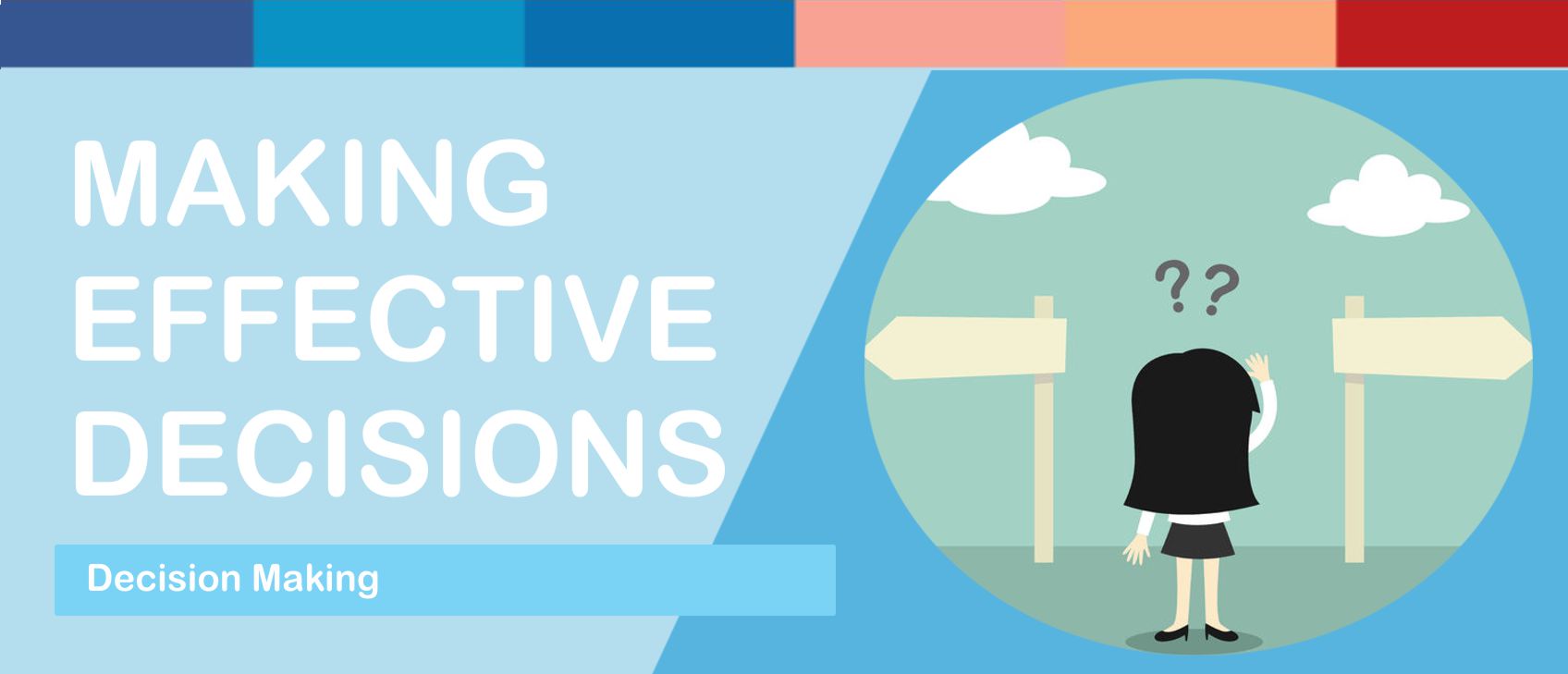
Making Effective Decisions or Decision Making as it is traditionally called is one of the most common competencies required at any level and in most roles. While decision making is simply choosing between two or more outcomes, effective decision making is about making sure the right option is chosen.
We make decisions daily and they can be as small as deciding what to eat for lunch or have more significant consequences such as determining which home or car to buy. In a work environment the ability to make and take decisions is paramount and you will face interview questions exploring this competency at most levels and in most roles.
What does the Making Effective Decisions competency mean?
Put into simple terms, Making Effective Decisions means researching, gathering and using data and information accurately to evaluate options. Following a proper process and applying sound judgement and reasoning to come to the right solution. It also involves taking personal responsibility for your decisions, being confident in explaining them and making sure they are implemented and learning from mistakes.
Making Effective Decisions Competency Interview Questions
Here is a small selection of competency based interview questions related to Making Effective Decisions taken from the InterviewGold online training. How would you answer?
- Tell me about a recent decision you made where you acted outside of standard procedure. What were the circumstances and what was the result?
- Talk me through a mistake or something you did wrong in your previous job.
- Describe a time when you had to choose between a number of different options in order to achieve a particular result.
Competency answers – Making Effective Decisions examples you can talk about
In the interview you will need to make clear the process you have adapted in coming to your decisions. Crucially, you must follow departmental or organisational procedures or guidelines without deviation. The process you follow is critical. Employers want to know that you have used a sound approach to making decisions, you have used judgement backed up by accurate data and evidence.
When creating your answer show that you have used your reasoning, insight and objectivity in order to make a decision that will provide the most value and is most likely to achieve success for the specific objective in question. Effective decisions are both an intuitive and reasoned process, showing that you’re careful, thoughtful and considerate.
Decision making competency examples you can choose can relate to a personal or work-related situation. They can be regular or one offs, strategic or operational decisions. Here are some potential scenarios to help refresh your memory when choosing your examples.
Can you recall when you made a decision about…
- Prioritisation of tasks and how to complete them most efficiently.
- Scheduling tasks, meetings and people.
- Dealing with client or customer issues.
- Handling conflict or other staff problems.
Looking for sample answers for Making Effective Decisions?
7. Managing a Quality Service

Managing a Quality Service is one of the Civil Service 9 core behaviours included in the success profiles framework. It is a key competency and one that is required at all levels in all departments.
Indeed, outside of the Civil Service and Government the ability to manage resources and to deal with clients and customers effectively is a key skill.
What does the Managing a Quality Service behaviour mean?
Put into simple terms, managing a quality service is all about completing your job and meeting your objectives in the most efficient and effective way.
It can involve providing the best possible service to others both external or internal such as other departments, teams or stakeholders.
Depending on the role it may require dealing directly face to face with customers. For example, a DWP Work Coach role brings direct contact with clients and Managing a Quality Service would be an essential behaviour.
Competency Based Interview Questions for Managing a Quality Service
Here is a small selection of competency based interview questions related to Managing a Quality Service taken from the InterviewGold online training. How would you answer?
- Can you describe a time when you have been proactive in finding a solution to a problem encountered by your customers.
- Give me an example of a time when you dealt with a difficult client situation.
- Describe a time when you had to work exceptionally hard to provide great service. What did you do and what was the outcome?
The panel will listen for key positive behaviours and they will score your answer based on what they hear. They will note words or phrases or actions that tick these boxes and that demonstrate your ability.
They will also listen for a demonstration of relevant strengths and you can find these in your interview invite. Your answer must be well formed and sufficiently detailed to score well.
Managing a Quality Service Examples
So, when it comes to your interview, you must give an answer that scores high. To do that you must choose a strong, relevant example to talk about. Format it correctly, emphasise the behaviour clearly and show that you are competent.
Managing a Quality Service can be displayed in many forms both inside and outside of work and here are some potential scenarios to help refresh your memory when choosing your examples.
Can you recall a time when you….
- Dealt with a particularly difficult customer complaint and personally managed it to ensure the customer got the highest level of service.
- Did something extra to improve the level of service you gave a client, perhaps went over and above what the customer expected while always working within your policy and procedures.
- Adapted the way you completed a task or serviced a customer so as to get a better result or complete it faster or to a better standard.
- Did something to increase productivity, profits or save costs while maintaining top quality.
Civil Service Interview Coming Up?
Pass your Civil Service interview with InterviewGold’s powerful online system. Get expert STAR answers, Personal Statements, blended mock interviews and much more.
8. Managing Conflict
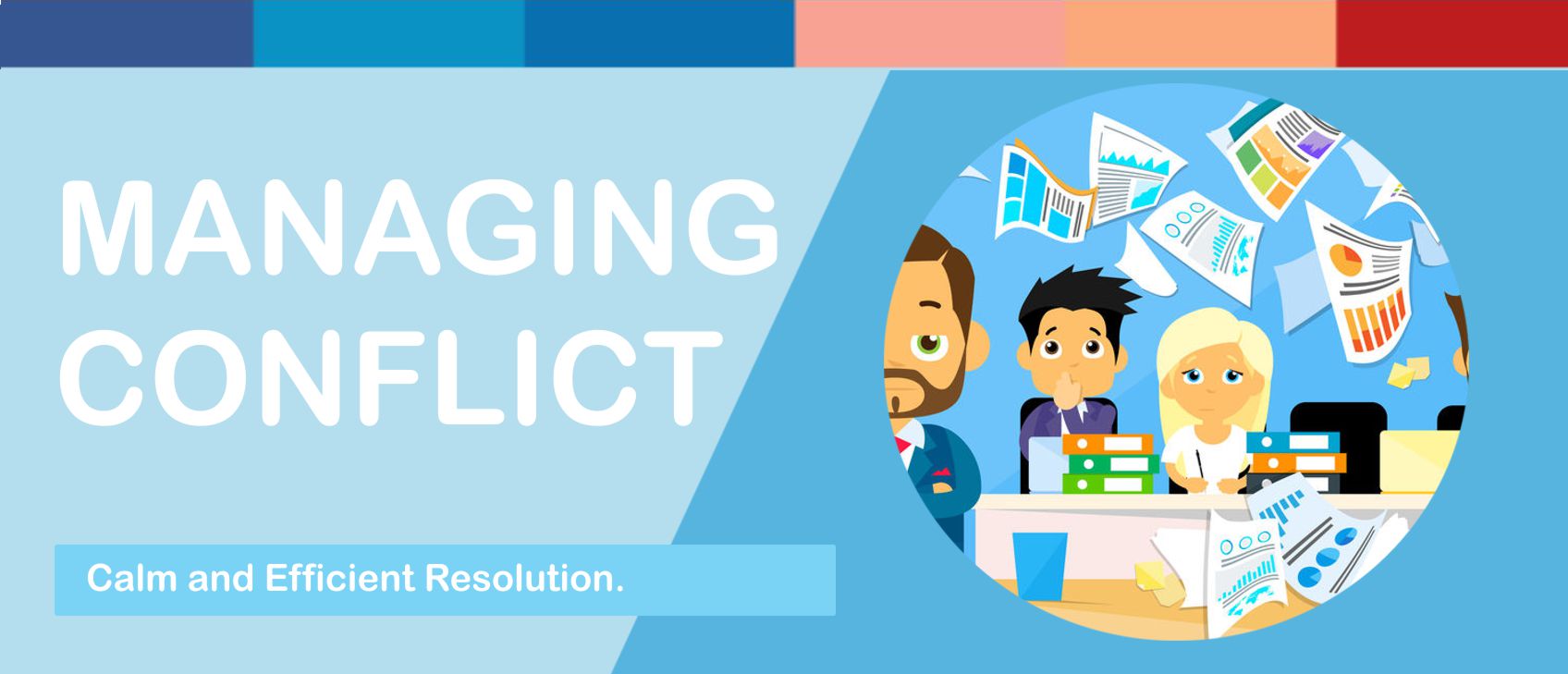
Differences of opinion and clashing perspectives can lead to disagreements both in and out of the workplace. When people are working closely together, it is inevitable that conflicts will happen. Furthermore, it is important to prospective employers that you can manage these disagreements effectively and fairly.
What does the Managing Conflict competency mean?
Put into simple terms, Conflict Management includes the ability to identify and deal with clashes between people efficiently, sensibly and reasonably. Interviewers ask these questions because they want to find out about your own ability to manage conflicts and your general interpersonal skills.
Conflict Management Competency Interview Questions
Here is a small selection of competency based interview questions related to Conflict Management taken from the InterviewGold online training. How would you answer?
- Tell me about a time when you successfully resolved a conflict.
- Tell me about a time when you experienced opposing views on your team. What did you do to overcome this?
- Describe a time when you had to manage conflict in your team or among your colleagues. How did you approach this situation and how did you resolve it?
How to answer in your interview – Managing Conflict examples you can talk about
Conflicts can take place in all aspects of work and between any members of the team. A disagreement could occur between colleagues, departments or managers and it could be about anything from the best way to work on a new project to deciding to recruit more team members.
Conflict Management can be displayed in many forms and here are some potential scenarios to help refresh your memory when choosing your examples.
Can you recall a time when you….
- Resolved a disagreement between two members of your team, between team or departments.
- Customer service issues can escalate into conflict without management.
- Dealt with a situation where a member of staff had different ways of working or different ideas about how best to achieve an outcome.
Read More: How to Get Winning Answers to 32 Different Competencies with InterviewGold »
9. Problem Solving
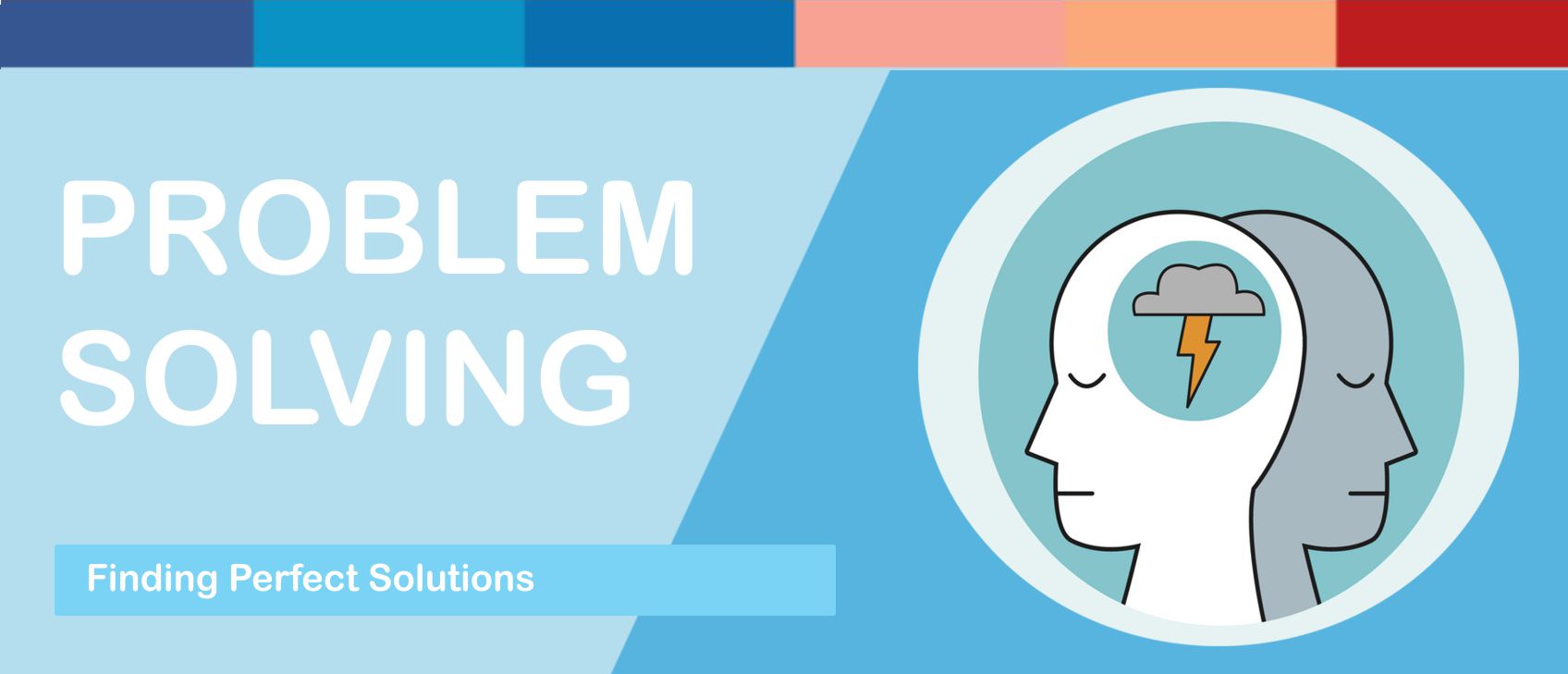
Problem Solving is a competency which is in demand from pretty much all employers. It refers to the act of effectively finding solutions to problems and implementing them.
What does the Problem Solving competency mean?
Put into simple terms, Problem Solving means recognising a problem, analysing it objectively using your experience, initiative and intelligence. It involves developing and implement solutions having considered a variety of alternatives and options and comparing the risks and benefits of each and the impacts on others. At all times you must apply clear pre-set procedures or policies as per your department or organisation.
Problem Solving Competency Interview Questions
Here is a small selection of competency based interview questions related to Problem Solving taken from the InterviewGold online training. How would you answer?
- Tell me about an occasion when you went out of your way or spent a significant amount of time analysing the cause of a particularly complicated problem. How did you proceed and what was the result?
- Describe a complicated problem you have had to deal with. How did you tackle it and what was the outcome?
- Talk through a situation where you developed an innovative solution to a complex problem.
Competency answers – Problem Solving examples you can talk about
Problem solving means being proactive and positive. It is best to show that you are aware of and look for issues constantly, you don’t shy away and wait for instructions or worse wait until the problem gets bigger before you do something about it.
There will be a whole range of scenarios you can choose to talk about and here are some potential scenarios to help refresh your memory.
Can you recall a time when you….
- Noticed something going wrong with a task or project, perhaps an early indication that it just would not work. You raised this as an issue and you suggested a change which kept the activity on track.
- Came up with an innovative solution to a problem that had been around for some time and nobody else could solve.
- Realised that a significant mistake had been made that could have derailed a project being delivered on time and you resolved it successfully.
Answer any Competency Interview Question Perfectly

Join InterviewGold today and get instant access to expert STAR answers, job specific questions plus powerful answers, all designed to help you win jobs.
10. Planning and Organising
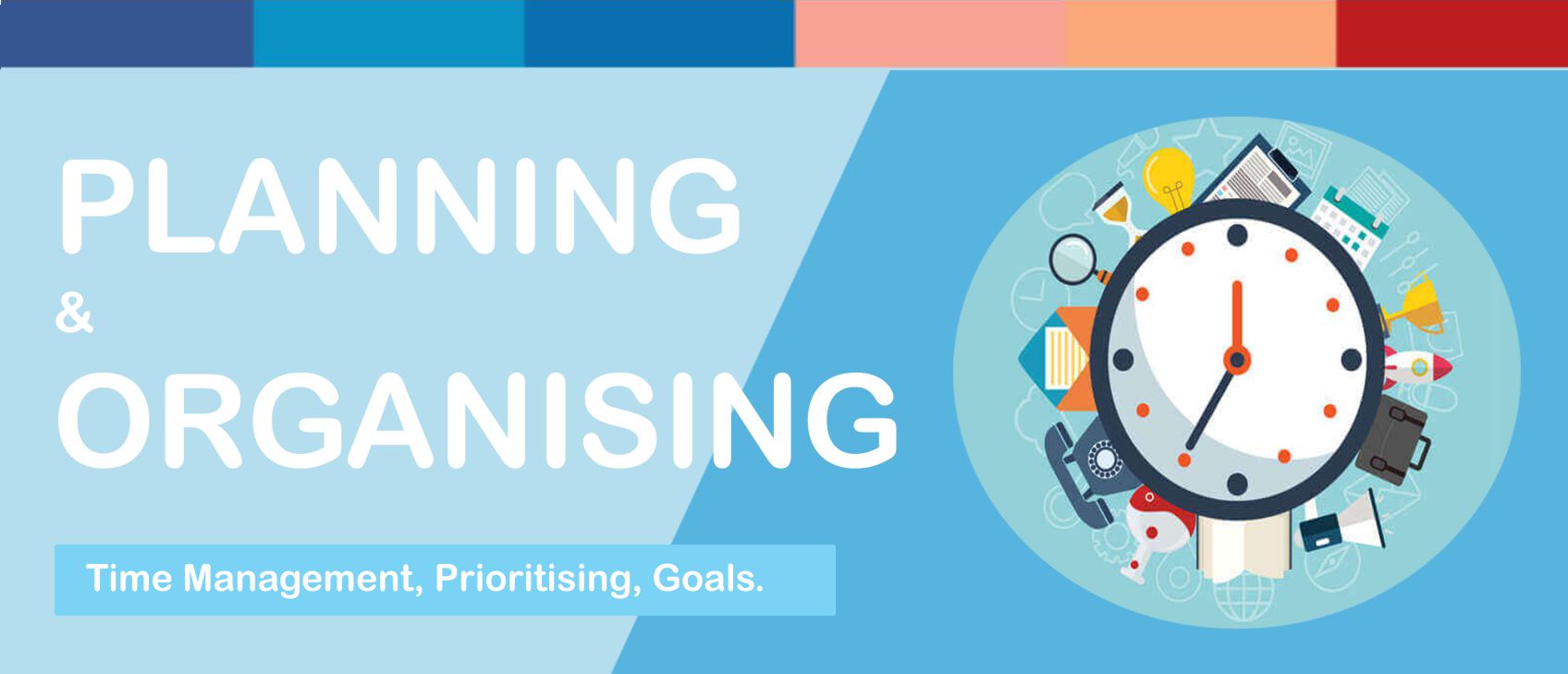
Planning involves having an objective in mind with a clear vision of the end result and how you will get there. As well as having the final goal in mind, planning will often require setting regular objectives or milestones which can help to track your progress. With planning, you may choose to set up an action plan if it is a specific project. Alternatively, it may suit you to have a schedule or timetable with deadlines so that you can manage your time well.
Organisation follows on from planning, by knowing your objectives and how to meet them through planning and prioritising. This can help you to maintain focus on your goals and ensure you can manage all of your responsibilities, activities and commitments effectively. Organisation can come simple aspects such as keeping your workplace tidy and logical to adjusting to an organisational structure.
Finally, prioritising enables you to focus on the most important and urgent tasks. When it there are lots of deadlines and activities to plan, you need to prioritise where your focus should lie.
Planning and Organising Competency Interview Questions
Here is a small selection of competency based interview questions related to Planning and Organising taken from the InterviewGold online training. How would you answer?
- Tell us about a situation where your time management skills let you down.
- Describe a time when you used your organisational skills effectively to complete an important activity.
- Talk through a situation when you planned effectively so as to complete a number of simultaneous tasks on time.
How to answer in your interview – Planning and Organising examples you can talk about
With proper planning, organisation and prioritisation, you can get more done while saving your team and department both time and money. There will be a whole range of scenarios you can choose to talk about and here are some potential scenarios to help refresh your memory.
Can you recall a time when you….
- Created a deadline and stuck with it despite obstacles and even though you were given additional tasks.
- Were really disciplined with your time, didn’t become distracted or give in to procrastination.
- Had a long list of tasks and prioritised them.
- Managed your time, allocating correctly to each task and getting the work done successfully.
Looking for Expert Sample Answers for Planning and Organising?
PLUS use our powerful online Competency Answer Builder tool to create your own brilliant answers in minutes. Click here to learn more »
11. Seeing the Big Picture
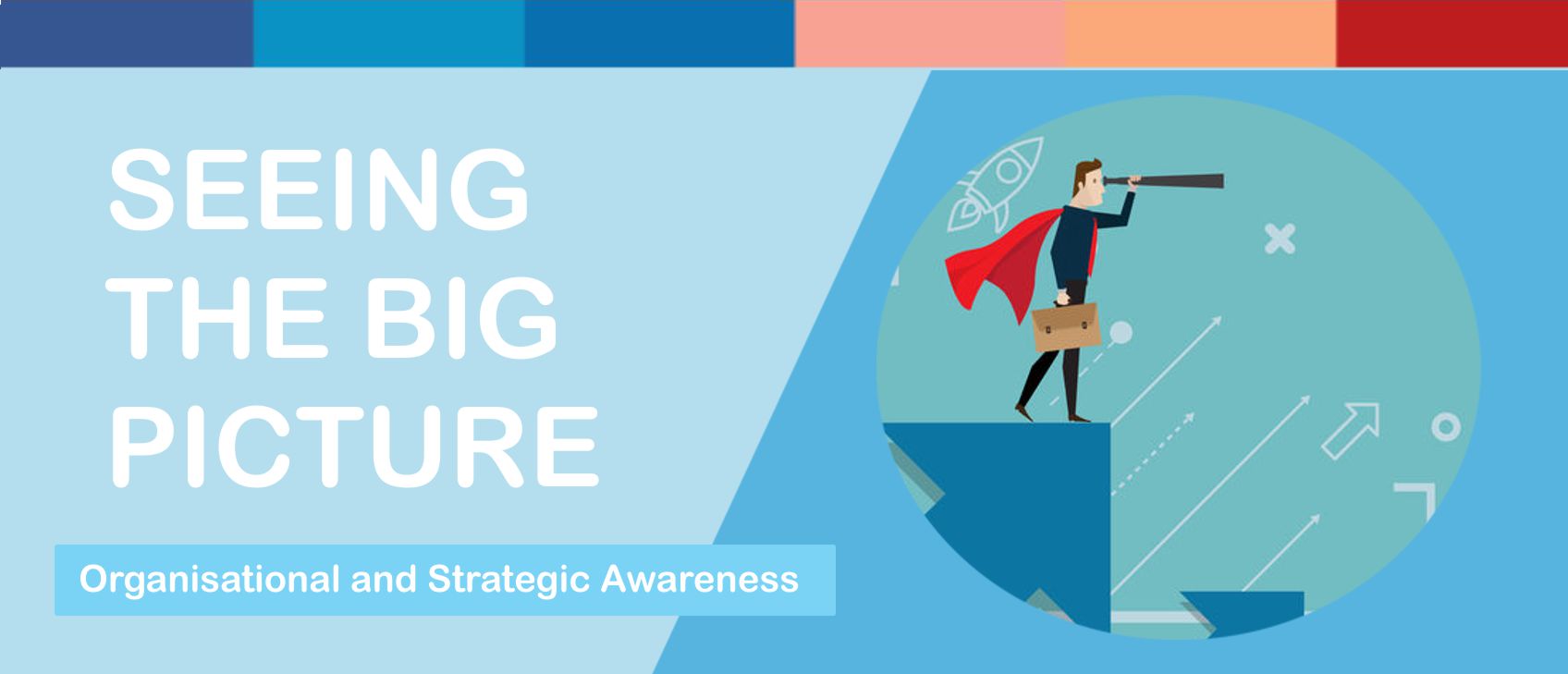
When it comes to competency based interviews, especially in Civil Service and Government departments, you should expect questions exploring the competency Seeing the Big Picture. Not only is it one of the 9 Civil Service Success Profiles behaviours it is a competency used by many large employers.
So what does the Seeing the Big Picture competency mean?
Put into simple terms, Seeing the Big Picture means being able to look beyond your own role and tasks and having an awareness of how your activities feed into the performance of your team, your department and the organisation. For all staff, it is about focusing on delivering the organisations goals in the most effective and efficient way possible. You may see it referred to as Organisational or Strategic Awareness or Strategic Management and it is about your ability to make a connection between your day to day tasks and the overall goals of your department and your employer.
Seeing the Big Picture Competency Interview Questions
Here is a small selection of competency based interview questions related to Seeing the Big Picture taken from the InterviewGold online training. How would you answer?
- Describe a situation where you worked outside of the scope of your role.
- Tell me about a time when you have collaborated with another department in order to deliver a positive outcome.
- Give an example of an achievement which directly contributed to your department goals.
Competency Answers – Seeing the Big Picture examples you can talk about
Seeing the Big Picture means you should look beyond individual tasks and assess whether or not they will help to meet targets or to get the team to the end goal. For your interview answers, ideally choose examples which took you outside of the normal scope of your work. Here are some potential scenarios to help refresh your memory.
Can you recall a time when you….
- Took on a task or got involved with a project so as to keep up to date with issues.
- Got involved in discussions about the direction, mission and goals of your Department or the organisation.
- Asked for secondment to other teams, areas or departments in order to see the bigger picture.
Want to Pass Your Civil Service Interview?
12. Working Together (Teamwork)
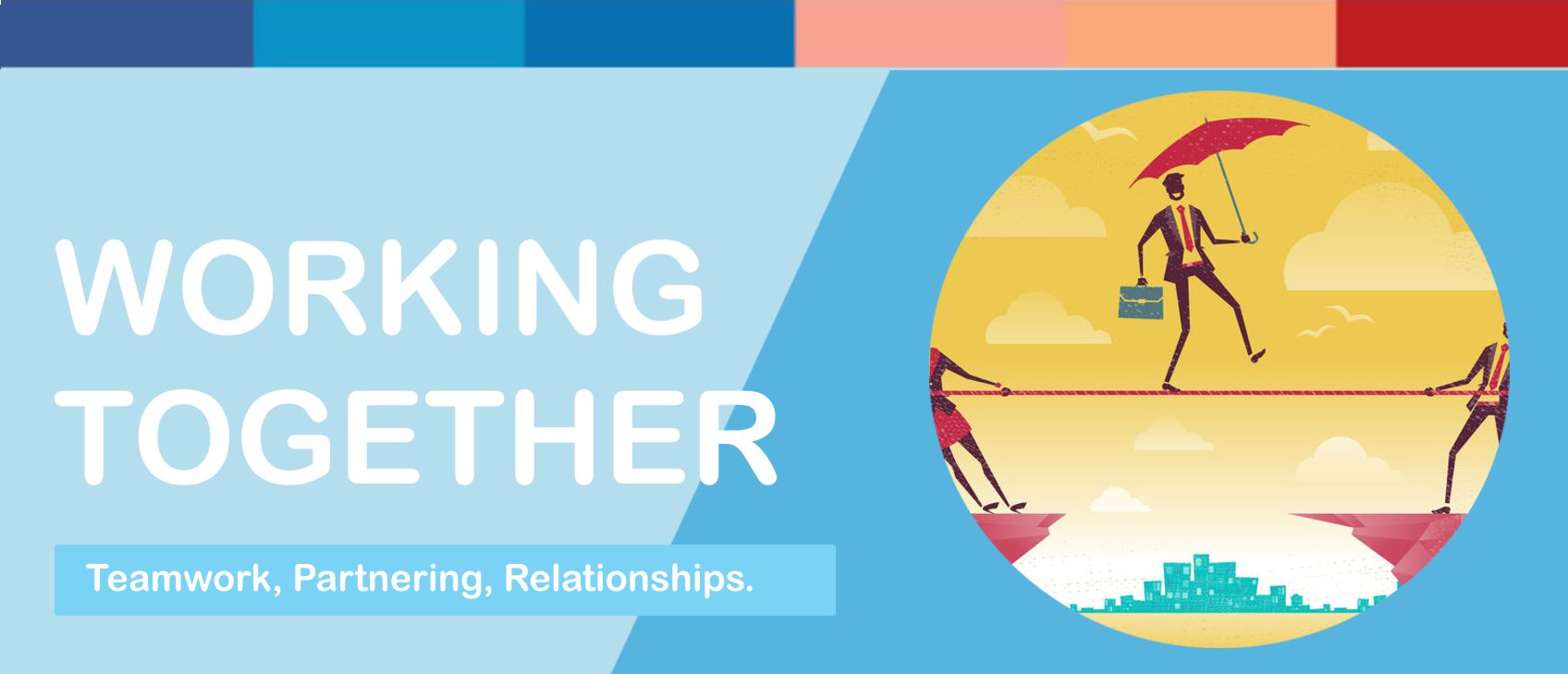
Being able to work with others in a team is a skill that impacts all aspects of our lives. Whether it is working together with colleagues, friends or family, it is important to be able to work effectively in a group to achieve a goal.
When you can work well in a team, a lot more can be achieved both on an individual basis and as a group as a whole. Goals can be met and tasks can be completed faster and more efficiently.
What does the Working Together / Teamwork competency mean?
Put into simple terms, Working Together or Teamwork as it is more commonly know means being a team player, contributing, collaborating, offering support and help to colleagues, sharing ideas, giving advice and input in order to get something done. It involves building relationships within your own area and outside, and being enthused about sharing knowledge, information and learning. Show genuine interest when listening to others.
Working Together / Teamwork Competency Interview Questions
Here is a small selection of competency based interview questions related to Working Together / Teamwork taken from the InterviewGold online training. How would you answer?
- Describe a situation where you were successful in getting people to work together effectively.
- Tell me about a time when you have had to rely on someone else in order to get something done.
- Describe a situation in which you were a member of a team and a conflict arose within the team. What approach did you take?
How to answer in your interview – Working Together / Teamwork examples you can talk about
Even in roles where you predominantly work alone, there is usually an element of teamwork involved, whether it is with different departments, partners or external suppliers. It can be as simple as working with a colleague, accepting, offering support, sharing ideas, giving advice and help in order to get something done.
Working together can be displayed in many forms and here are some potential scenarios to help refresh your memory when choosing your examples.
Can you recall a time when you….
- Shared your ideas and knowledge in some way, perhaps with a new colleague or in a team.
- Helped a staff member returning to work after illness or boost their morale in some way.
- Supported your colleagues with their workload when required; perhaps offering rather than being asked.
Answer Competency Based Questions with 100% Confidence
Practice and prepare with InterviewGold’s easy to use, online system and dramatically boost your chances of success in your next interview. PLUS get instant access now to expert template STAR answers for your job.
Competency Based Interview Questions and Answers for Managers
Are you seeking a role in a manager or leadership post? It can be very exciting to get moving up the career ladder and to take on extra responsibility for perhaps managing a team for the first time or taking on a larger group. However, you have to get past the interview and you should expect questions exploring your readiness to succeed in the promotion.
For example, how would you answer this common competency based questions for manager or leadership posts:
- Give us an example which shows that you can motivate a team to get the very best performance from them.
- Tell me about a time you helped someone develop new skills. What approach did you use to get them up to the required level of performance how successful would you say you were?
When answering you need to show the positive behaviours that will score highest including an ability to promote diversity and inclusion, being open to others views, to take them on board with respect, being able to inspire, sharing a vision and ultimately motivating your team to deliver against goals.
The InterviewGold online training is designed to give you competency questions and answers relevant to your level and covers from starter up to Senior Manager level. It includes template answers for all the core competencies which you can use to help create your own winning answers.
How to Answer Competency Based Interview Questions Like a Pro
For so many candidates these competency based, behavioural or situational questions can pose real challenges. However, the good news is that giving top answers is a learned skill.
The key to a great answers lies in a combination of choosing a good example to talk about and bring proper structure to it.
1. Relevant Examples of Each Competency
So firstly, when preparing your competency based interview answers, I suggest choosing examples based on real experiences you have had. Avoid the temptation to invent or embellish and most important do not use a template answer from a book or online as you run the risk of being caught out by probing questions.
The situation you talk through in your answer must be relevant to the competency being explored. So for example if they ask about Communication, your example must demonstrate your skills when communicating be it to an individual or group, verbally or in writing but it must be focussed.
In addition, it must be sufficiently complex and detailed to show that you understand what is required, that you possess the relevant core competency and can use it effectively in a variety of scenarios.
Your answers will be scored and these will depend on the extent of your preparation. Use the job description or advertisement to know the essential competencies required and for each prepare examples of situations where you used these skills to achieve a successful outcome.
2. Bring Proper Structure to Your Answer
Most competency based and behavioural interview questions require you to give an example of a situation you have been involved in. This sounds straightforward however it is very easy to give a long rambling answer resulting in a low score. The key to an effective and top scoring competency answer lies in it’s structure and there are two standard formulas we recommend:
1. The STAR technique = This method is often referred to as the CAR and PAR technique and gives a logical process to create and deliver your answer. Learn more about the STAR Method here.
2. The iPAR technique = Similar to the STAR technique and is favoured by us as it brings greater focus on using a powerful introduction summarising the achievement plus we suggest always answering in the first person using ‘I’ rather than ‘we’ even if your example refers to a team effort. The interviewers want to hear about what you did and if you constantly use ‘we’ it could weaken your answer. While we favour the iPAR technique, feel free to use whichever you are most familiar and comfortable with.
Get Instant Access Now to Expert Sample Competency Answers
PLUS use our powerful online Competency Answer Builder tool to create your own brilliant answers in minutes. Click here to access now »
Sample Competency Based Interview Answer – Use This as a Guide
One of the most common competencies is Achieving Results also known as Delivering Results or Delivering at Pace, the latter used in Civil Service roles. Here is a sample answer to a question relating to that competency for a middle management post.
Remember to tell it like a story as this will better engage the interviewer. Here is a sample competency answer using the iPAR technique above.
Sample Competency Answer:
Question: Tell me about a difficult project you managed and describe the obstacles you encountered and how you overcame them.
Introduction
In my last role with ABC Corporation Ltd I introduced a new system of monitoring and assessing electronic customer feedback which has reduced the time it takes to deal with customer service complaints from 9 days to 48 hours.
Problem
I discovered that we were getting a lot of customer communications, feedback and complaints via email, but we had not developed any structured method to handle these. In addition we were not using them as an opportunity to learn about our customer or to drive process improvement initiatives. I realised very quickly that not only was this an issue for us which I knew I could solve quickly but I also saw the potential to enhance our relationship with our customers.
Actions
I completed a business case clearly outlining the benefits of this action. I then set up a project group with the goal to deliver a system of processing and managing these emails. I recruited internally as I wanted to give my team exposure to working on such a project. I put regular reporting in place, ensured that all stakeholders were involved and communicated with. Three weeks after starting the project I lost two team members due to sickness – we were on a very tight deadline and I knew that the success of this project lay in my ability to motivate and manage the team I had. I identified key replacements and revised the plan accordingly so that work would not fall behind. I ensured the team knew what had to be delivered and by when and I got staff buy-in from very early on. During the course of the project I managed the team, rescheduled tasks as required, communicated regularly with all interested parties and ultimately delivered the project successfully.
Results
I overcame the challenges and I delivered the new system on time and within budget. As a result of this system my team can address 100% of customer service emails within 48 hours, we have reduced the volume of complaints received by 35% and we have a suite of reports that can help us deliver further improved customer service. It’s a great achievement and one which I am very proud of.
Note the use of “I” throughout and note too the use of a powerful lead sentence which summarises the achievement and sets up the rest of the answer to come. This is a great selling tool and designed to get the attention of the interviewer.
Want Expert Sample Competency Answers Specific to Your Job?
PLUS use our powerful online Competency Answer Builder tool to create your own brilliant answers in minutes. Click here to access now »
Get Instant Access Now to Winning Answers to Competency Based Interview Questions With InterviewGold
With the InterviewGold online training system you have access to a host of great content all designed to help you succeed in competency based interviews.
You get questions, sample answers, the positive behaviours to use along with expert training all on one easy to use online package.
- Sample answers covering 45 different competencies and behaviours
- Powerful Competency Answer Builder tool to help you create your own great answers
- Learn all about competency based interviews and success profiles
- Get questions and answers specific to your target job
- 32 Competencies covered – 500 competency questions included
InterviewGold will help you with all stages of the process including the application, personal statement, assessment centre and of course the interview.

